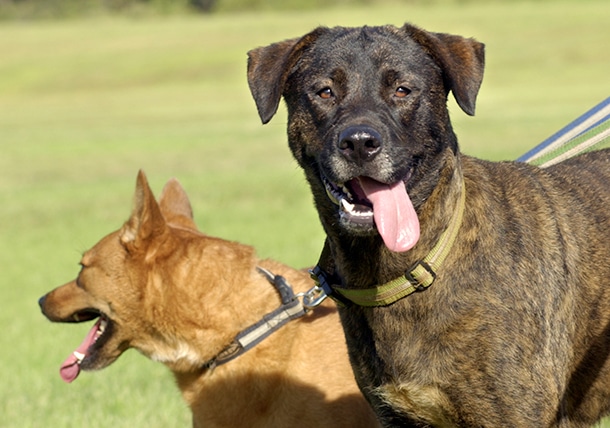Panting is a normal dog behavior because a dog sticks out its tongue, breathes in air through its nose, and breathes out through its mouth.
Dogs are also known to be playful and active, hence, they often engage in intense physical activities and breathe heavily thereafter.
However, there are situations panting could be a sign of a problem with your dog.
Causes of Dog Panting
There are different causes of a dog panting, and here are some of the reasons your dog pant, pace around or get a little scared.
Dog Panting as a Normal Behavior
When dogs inhale air, it hardly reaches their lungs, therefore, panting helps to heighten gas exchange in their lungs.
Also, the airflow caused by panting increases moisture on the mucous membranes, which helps in controlling the body temperature of dogs.
Dogs don’t usually sweat, therefore, they pant as their natural behavior to release moisture on the skin and prevent overheating.
After exertion or in extreme heat, intense panting is also important in the dog.
When your dog pants after excitement, this should also be classified as normal behavior.
When to get worried about Dog panting
If your senior dog is panting heavily at night, or your dog is breathing heavily and pacing around or while resting, veterinary doctors have linked it to possible symptoms of a disease.
Normal dog panting is not continuous over a long period, but when your dog pants heavily regularly and it’s not a shaker dog, it could be a heart problem.
There are various heart diseases of dogs such as mitral valve endocarditis, dilated cardiomyopathy (DCM), pericardial effusion, etc. which could make the heart have a lower pumping capacity.
As a result of this, the body cells are poorly supplied with fresh blood and thus with oxygen, hence the dog pants heavily to increase its heartbeat rate.
A backlog of blood in the lungs can lead to panting, not being fit, as well as coughing.
If the dog pants very often, this can be an indication of pain – parallel lameness or vomiting (in the case of abdominal pain) are then the symptoms to watch in the diagnosis of the health issue.
If the dog snores while breathing, this is an indication of a narrowing of the upper airways, for example in the area of the larynx.
This often occurs in short-headed dogs such as bulldogs or pugs when they become aged.
Panting and pale mucous membranes can indicate not only circulatory problems but also anemia.
How to calm a Panting Dog
Since panting is just a symptom, which can have many reasons, the therapies are correspondingly diverse.
If your dog panting is not linked to diseases by a dog doctor, here are homemade remedies to help calm your dog.
- Try to touch and massage your dog
- Offer your dog nice cookies or toys
- You can take the dog on a workout
- You can make the dog rest with you
- You can also play music for your loving pet
- You can also wear a calming coat for your dog
If your dog is panting heavily as a result of an inherent health issue, you’ll need to speak to your doctor for a remedy.
For example, high fever, food poisoning, chronic diseases, heart problems, etc
To detect heart problems, for example, an X-ray of the chest or an EKG (echocardiogram) may be necessary.
Dogs like dachshunds, chihuahuas, and poodles, DCM in e.g. boxers, mastiffs, Dobermans often suffer from heart problems such as mitral valve endocarditis, and heavy panting by these dogs should be taken seriously.
Heart ultrasound and blood tests are also helpful in diagnosing heart disease.
Conclusion
Your dog is likely to pant after physical activities when the weather is extremely hot when he’s afraid and in other situations when panting can be seen as a response to a stimulus.
However, if you notice your dog pants heavily all the time, you will need to take it to a vet doctor for a check.
Panting could be a symptom of cardiovascular problems in dogs or other health issues, only a dog doctor can confirm this.

Growing up in a family deeply rooted in agriculture, I developed an early passion for cultivating the land, caring for animals, and exploring sustainable ways to improve farm productivity.
I’ve worked extensively across multiple areas of agriculture, food and cash crop cultivation, poultry farming, fish farming etc.
At FarmPally, I enjoy sharing practical insights drawn from real-life experiences to help farmers, pet owners, and agriculture lovers make informed, and sustainable decisions.

